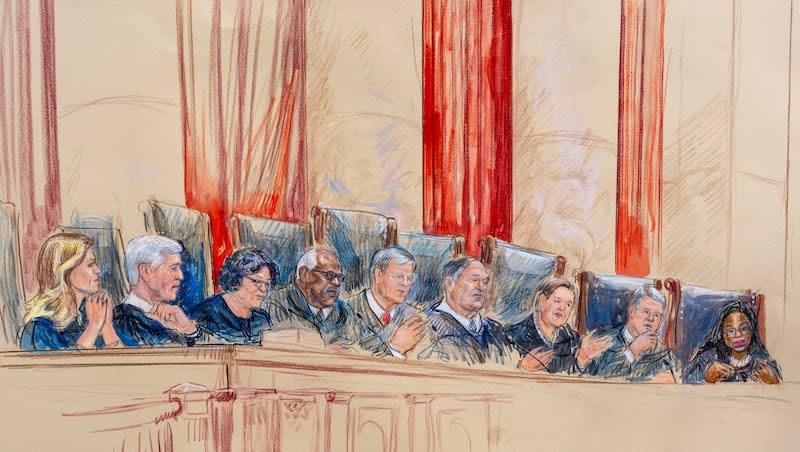What the Supreme Court’s new case on gender-related health care for minors could mean for Utah

- Oops!Something went wrong.Please try again later.
- Oops!Something went wrong.Please try again later.
- Oops!Something went wrong.Please try again later.
- Oops!Something went wrong.Please try again later.
- Oops!Something went wrong.Please try again later.
- Oops!Something went wrong.Please try again later.
- Oops!Something went wrong.Please try again later.
- Oops!Something went wrong.Please try again later.
- Oops!Something went wrong.Please try again later.
As the debate over transgender health care heats up across the country and around the world, the Supreme Court is wading into the fray.
The justices on Monday agreed to hear a case centered on Tennessee’s ban on certain gender-related procedures for minors and decide whether such state-level policies violate the Constitution’s equal protection clause.
Although it will be focused on Tennessee, the Supreme Court’s eventual ruling will likely hold ramifications for Utah and other states that have recently passed laws limiting minors’ access to gender-related treatments.
Last year, the Utah Legislature passed a law banning transgender surgeries, puberty blockers and cross-sex hormones for children and teens, as the Deseret News reported at the time.
Tennessee’s transgender health care law
The Supreme Court case originated in 2023 soon after Tennessee lawmakers passed a law banning transgender children and teens under the age of 18 from receiving hormone treatments, having gender-transition surgeries and accessing puberty blockers.
The law does not prevent other young people from receiving some of those same treatments.
“It allows the use of hormone treatments for other patients under 18, such as those who begin puberty too early,” according to SCOTUSblog.
Three teens in Tennessee filed a lawsuit with the goal of overturning the policy. They argued that it violates the Constitution’s 14th Amendment by treating transgender patients differently than other young patients — like the children experiencing puberty too early.
The Biden administration later joined the case in support of the teens’ argument.
The district court judge who heard the case agreed that Tennessee’s law violated the 14th Amendment and blocked the parts of the policy dealing with puberty blockers and hormone therapy from taking effect.
But then, the 6th Circuit U.S. Court of Appeals overturned that decision, allowing the ban on gender-related procedures for minors to fully take effect.
The Biden administration appealed to the Supreme Court, which has now agreed to hear the case.
What has the Supreme Court said about transgender rights?
The Tennessee case will be the first fully briefed and argued Supreme Court case on transgender health care.
The justices have only previously weighed in on the topic through an emergency order. A majority voted in February to an Idaho law banning gender-related procedures for minors to temporarily take effect.
“The decision in that case, which came to the justices as an emergency application, appeared to split largely along ideological lines, with the court’s liberals dissenting,” according to The New York Times.
In 2020, the court ruled 6-3 in favor of gay and transgender workers in one of its most memorable cases dealing with transgender issues.
Writing for the majority, Justice Neil Gorsuch said that bans on sex discrimination in the workplace cover discrimination against gay and transgender workers. In his dissent, Justice Samuel Alito argued that the ruling would make it easier to use the 14th Amendment to challenge laws related to LGBTQ rights.
The justices will hear the new case, United States v. Skrmetti, sometime this fall.

